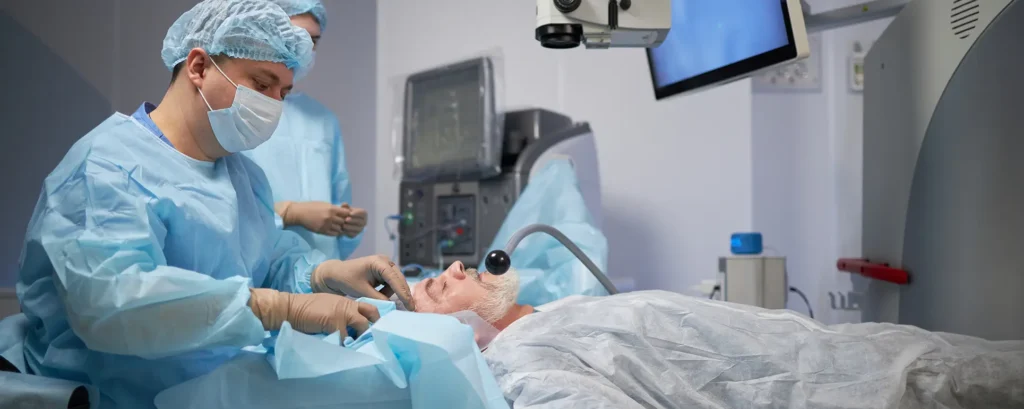If you’ve been told you need cataract surgery, one of the first thoughts that probably came to mind is, “Will it hurt?” That’s a completely normal worry. After all, the eyes are incredibly sensitive, and the idea of having a surgeon operate on them can feel daunting. But the reality is often very different from the fear. Cataract surgery is one of the most common procedures carried out worldwide, and thanks to modern anaesthesia and surgical techniques, patients are usually surprised by how comfortable the whole experience is.
In this article, I’ll walk you through exactly what you can expect in terms of sensation before, during, and after cataract surgery. We’ll talk about how anaesthesia works, what the procedure actually feels like, what’s normal in the days afterwards, and how pain is managed if you do experience any discomfort. By the end, you’ll have a much clearer picture — and hopefully, a lot less anxiety.
Why Patients Fear Pain in Eye Surgery

It’s not unusual to feel anxious about pain when it comes to eye surgery. Unlike having a tooth removed or a cut stitched, the eye feels like an especially delicate part of the body. You can’t really imagine someone touching it without blinking or flinching. This natural instinct makes people believe that surgery on the eye must be painful.
There’s also the fact that cataract surgery is often the first major procedure people undergo as they get older. Many patients haven’t had any operations before, so they don’t know what to expect. Add to that the stories you may have heard from friends or relatives, and it’s no surprise that the thought of pain looms large.
But here’s the reassuring truth: cataract surgery is specifically designed to keep you comfortable. Surgeons and anaesthetists know how important this is, and the techniques used today have been refined to make sure patients don’t suffer during the procedure.
How Anaesthesia Keeps the Eye Comfortable
The key reason cataract surgery isn’t painful is anaesthesia. In most cases, this is given in the form of eye drops that numb the surface of your eye. These drops take effect quickly and block the pain signals from reaching your brain. You’ll still be aware of movement, light, and pressure, but the sharp, painful sensations are completely blocked.
Some patients may also be given a mild sedative to help them feel more relaxed. This doesn’t knock you out — cataract surgery is usually done with you awake — but it takes the edge off any nerves. In rare cases, a small injection around the eye might be used for additional numbness, but the majority of patients get by with drops alone.
The combination of numbing drops and, if needed, light sedation means you can have surgery while feeling calm and comfortable. You won’t see or feel anything sharp, and you’ll be guided gently through the process by your surgeon and nursing team.
What the Procedure Feels Like

So what does cataract surgery actually feel like? Patients often describe it as “strange” rather than painful. You’ll be lying down on a surgical bed, with your eye numbed and a special device holding your eyelids open so you don’t need to worry about blinking.
During the surgery, you’ll notice bright lights and perhaps some shifting shapes or colours. This is because the microscope and instruments create visual effects inside the eye. Some people even find the lights oddly beautiful.
You may also feel a little gentle pressure or movement as the surgeon works, but this is not painful. The most common description is a sense of “something happening” in the eye, without any pain. In fact, many patients are surprised at how quick it is — the surgery itself usually takes 10 to 20 minutes.
What Happens Immediately After Surgery
When the operation is over, most patients still feel no pain at all. The eye remains numb for a short while after the anaesthetic drops wear off. As sensation returns, you may notice a mild scratchy feeling, as if you’ve got a tiny bit of grit in your eye. This is very common and usually fades within a day or two.
You might also feel a little sensitivity to light, some watering, or mild irritation. These are all normal signs that the eye is healing. Importantly, these sensations are not usually described as painful — just a bit uncomfortable. Most patients find that over-the-counter pain relief, if needed at all, is more than enough to handle it.
How Pain Is Managed in Recovery
If you do experience any discomfort after cataract surgery, there are straightforward ways to manage it. Your surgeon will usually recommend lubricating eye drops, which soothe irritation and prevent dryness. Anti-inflammatory drops are also prescribed to reduce swelling and protect against infection.
In the rare case that you feel sore, standard painkillers like paracetamol or ibuprofen are normally sufficient. You won’t be prescribed strong pain medication, because it just isn’t necessary for this type of surgery.
The most important thing is to follow your aftercare instructions. Avoid rubbing your eye, keep up with the prescribed drops, and attend your follow-up appointments. This not only helps with healing but also prevents discomfort from becoming worse.
Why Cataract Surgery Is Rarely Described as Painful
It’s worth repeating: cataract surgery is not generally considered a painful operation. Millions of people have it done every year, and the overwhelming feedback is that it was easier than they expected. For many, the hardest part is actually the anticipation, not the procedure itself.
The reason pain is so rare is the combination of excellent anaesthesia, minimally invasive techniques, and the speed of the surgery. Modern cataract surgery uses a very small incision, which heals quickly and with little irritation. Unlike other types of surgery, there are no stitches in most cases, which means less trauma to the tissues and less discomfort.
The Role of Individual Pain Tolerance
Of course, everyone experiences sensations differently. What feels like mild pressure to one person might feel more noticeable to another. Your level of anxiety can also play a role — if you’re very tense, you may be more aware of every sensation.
That said, surgeons and nurses are used to helping patients through this. If at any point during the surgery you feel uneasy, you can let them know, and they can give you additional anaesthetic drops or reassurance. You’re not left to suffer in silence — the team is there to make sure you’re comfortable at all times.
Common Misconceptions About Pain and Cataract Surgery
One of the biggest misconceptions is that because the eye is being operated on, it must hurt. In reality, the part of the eye being treated (the lens) doesn’t have pain nerves in the same way your skin or teeth do. What you actually feel is the surface of the eye, and that’s fully numbed before surgery begins.
Another misconception is that recovery involves weeks of pain. This is not the case. While you’ll be advised to avoid heavy lifting and rubbing the eye, most patients feel comfortable enough to go about their daily lives within a day or two. The recovery period is more about protecting the eye and letting it heal properly than about managing pain.
Reassurance for Anxious Patients
If you’re still worried about pain, it may help to remember just how routine cataract surgery is. In the UK alone, hundreds of thousands of people have it done each year. It’s one of the safest and most predictable procedures in modern medicine.
Surgeons are highly skilled at making patients feel at ease, and the whole process is streamlined to keep discomfort to an absolute minimum. Many patients even comment afterwards that they wish they hadn’t worried so much beforehand.
FAQ: Is Cataract Surgery Painful?
1. Do you feel pain during cataract surgery?
No, you won’t feel pain during cataract surgery because the eye is carefully numbed with anaesthetic drops before the procedure begins. These drops block the nerve signals from reaching your brain, so even though the surgeon is working on your eye, you won’t experience sharp pain. What you may notice instead is a sense of gentle pressure, movement, or light. Some people describe it as odd or unusual, but almost never painful. If anything feels uncomfortable, more anaesthetic can be given right away, so you are kept comfortable throughout.
2. What does cataract surgery actually feel like?
Patients often describe cataract surgery as a “strange” but not unpleasant experience. You’ll be aware of bright lights and shapes, since the surgical microscope shines into your eye, and you might even see bursts of colour as the lens is removed. In terms of sensation, you may feel some mild pressure or movement, but nothing sharp or painful. Many people are surprised at how quick the procedure is — often no more than 15 to 20 minutes — and how little they notice once it’s underway.
3. Will I be awake during cataract surgery?
Yes, most patients are awake during cataract surgery, and this is completely safe and comfortable thanks to local anaesthetic. Being awake means you can follow simple instructions, such as looking towards a light, which helps the surgeon carry out the procedure smoothly. For those who feel particularly anxious, a mild sedative can also be given to make you feel more relaxed. This approach avoids the risks of general anaesthesia and allows you to go home on the same day.
4. Can cataract surgery be done under general anaesthetic?
It can be, but this is very rare. General anaesthetic is normally reserved for patients who cannot lie still, have special medical needs, or are extremely anxious. For the vast majority of people, local anaesthetic drops are more than enough to keep the eye comfortable. This method is safer, has fewer risks, and allows for a much quicker recovery, which is why it is the standard of care across the UK.
5. How long does discomfort last after surgery?
Any mild discomfort after cataract surgery is usually short-lived. Many patients feel only slight irritation, a scratchy sensation, or some watering in the first 24 to 48 hours. This steadily improves as the eye heals. Most people report feeling comfortable within a few days, although full recovery of the eye can take several weeks. If discomfort persists longer than expected, your surgeon will check for any issues and adjust your care plan if needed.
6. Do I need painkillers after cataract surgery?
Most people do not need any painkillers after cataract surgery because the procedure itself is painless and recovery is usually very comfortable. However, if you do feel a bit sore afterwards, simple over-the-counter options such as paracetamol or ibuprofen are more than enough to ease symptoms. Strong painkillers are almost never required, which reassures patients that cataract surgery really is a gentle procedure compared to many other types of surgery.
7. Is the recovery period painful?
The recovery period after cataract surgery is generally not painful. Instead of pain, most patients notice mild irritation, dryness, or light sensitivity for a few days. These effects are normal and settle down quickly with the use of prescribed eye drops. Recovery is more about protecting the eye and allowing it to heal properly, rather than managing pain. Most patients return to their daily activities very quickly and are surprised by how smooth the process is.
8. What if I feel pain during the surgery?
It’s very unlikely that you’ll feel pain during cataract surgery, but if you do, the surgical team can act immediately. You’ll be able to communicate with your surgeon, and if necessary, they can give you additional anaesthetic drops to reinforce the numbness. Surgeons and nurses are highly experienced in keeping patients comfortable, and they won’t continue if you’re in pain. This means you’re in safe hands from start to finish.
9. Does everyone have the same experience with pain?
Not exactly — everyone’s perception of pain and sensitivity is slightly different. Some patients may be more aware of pressure or lights, while others hardly notice anything at all. Anxiety can also heighten awareness of sensations, which is why sedation is sometimes offered to very nervous patients. That said, the vast majority of patients describe cataract surgery as painless, and very few people ever report significant discomfort.
10. Should I be worried about pain before having cataract surgery?
It’s natural to feel nervous about the idea of eye surgery, but you don’t need to let fear of pain hold you back. Cataract surgery is one of the safest, quickest, and most comfortable operations in modern medicine. Millions of people undergo it every year and come away saying it was much easier than they expected. By learning what really happens, following your surgeon’s advice, and knowing that you’ll be kept comfortable at every stage, you can approach surgery with far more confidence and peace of mind.
Final Thoughts
So, is cataract surgery painful? The answer is no — at least, not in the way most people fear. Thanks to modern anaesthetic drops and highly refined surgical techniques, sharp pain simply isn’t part of the experience. What you may notice is a sense of pressure, light, or movement during the procedure, and perhaps some mild scratchiness or irritation in the days after. These sensations are usually short-lived and manageable with standard eye drops or simple pain relief, and for most patients the whole process is far more comfortable than they ever imagined.
If you’ve been putting off treatment because of worry about pain, it’s worth remembering that cataract surgery is one of the most commonly performed procedures in the world, with an excellent track record for safety and patient comfort. Millions of people every year have it done and are surprised by how easy it feels — especially compared to the anxiety they felt beforehand.
Ultimately, cataract surgery is about improving your quality of life by restoring clear vision. The worry about pain can seem overwhelming before the operation, but the reality is reassuringly different. By choosing an experienced surgical team and following the aftercare advice you’re given, you can look forward to a smooth, comfortable journey to better sight.
At London Cataract Centre, our surgeons place patient comfort at the centre of everything we do. If you’d like to explore your options and get clear advice about what’s best for you, you can book a consultation to discuss your needs and find out whether private cataract surgery in London is the right choice for restoring your vision with confidence.
References
- Bhatia, J., Varughese, S., Bhatia, A. and Gupta, A.K. (2013) Pain and discomfort during cataract surgery: patient’s experience and predictors of severe pain. Indian Journal of Ophthalmology, 61(9), pp. 407–410. Available at: https://pmc.ncbi.nlm.nih.gov/articles/PMC3716556/
- Filipello, M., Forlini, M., Darvizeh, F., Manes, G., Forlini, C. and Bratu, A. (2020) Pain control during cataract surgery using Mydrane versus lidocaine/adrenaline intracameral injection: a randomized controlled trial. Frontiers in Pharmacology, 11, 440. Available at: https://www.frontiersin.org/articles/10.3389/fphar.2020.00440/full
- Yang, L., Xu, Z., Xie, Y., Xie, Y., Song, X. and Chen, Y. (2022) Effects of comfort-improving nursing measures on postoperative pain in cataract patients: a meta-analysis. Annals of Palliative Medicine, 11(4), pp. 1331–1342. Available at: https://apm.amegroups.org/article/view/83713/html

